2019年译林牛津版 8A UNIT8 Natural disaster Task 教学课件 (共27张PPT)精品物理
初中英语译林版备课资料8AUnit 8 Natural disasters讲解分析+教案设计+习题设计+单元检测

Unit 8 Natural disasters单元概述单元教材分析:本单元围绕Natural disasters这个话题展开,让学生谈论了解各种自然灾难以及在各种自然灾难中如何自救,并注意从学生自己生活的实际环境出发,拓展了一些自然现象和自然灾害。
“Comic strip”部分通过Eddie和Hobo的对话情境,激发学生对本单元的学习兴趣,引出天气状况,同时初步导入本单元的重要语法——过去进行时。
“Welcome to the unit”部分通过对比自然灾难与人为事故来了解并掌握几种常见的自然灾难的名称,掌握句式:…if…和Was anyone hurt?等;“Reading”部分通过学习了解台湾地震幸存者Timmy的故事,了解台湾地震的基本情况,培养学生根据关键词和语境猜测大意的能力,学习并掌握大量的词汇、词组和句式,理解使用过去进行时的语境,同时培养学生根据已有的阅读材料抓住故事细节和故事情节发展的能力,引导学生运用正确的阅读技巧,全面提高阅读能力,教育学生在自然灾难中的自我保护。
“Grammar”部分介绍了过去进行时的构成和用法,学会“while”“when”和“as”在过去进行时中的具体运用;“Integrated skills”部分让学生通过听录音,从录音材料中提取信息,补全灾难预防提示表,并以“What should we do first?”让学生学会处理一些日常生活中的突发事故,训练学生的听、说、读、写技能;“Study skills”是英语构词教学中的一种,通过把两个独立的英语单词结合到一起构成另外一个单词,也就是“合成法”。
学生通过学会通过两个单词的意思,猜测出它们构成的新词的意思;“Task”部分通过回顾单元基础知识,学习在写作中陈述事实性信息,让学生根据一些要点完成Sandy 的范文,并根据范文设计出一种自然灾难文章的要点提纲,尝试写出相关文章。
训练学生的写作能力,综合运用英语的能力。
译林牛津版8A Unit 8 Natural Disaster Reading (共17张PPT)

If you are in the earthquake, what should you do?
Write a letter to your friends, and tell them the earthquake Timmy faced.
________________________________________________________ ________________________________________________________ ________________________________________________________ Try to use ________________________________________________________ ________________________________________________________ the phrases ________________________________________________________ we have ________________________________________________________ learnt today. ________________________________________________________ ________________________________________________________
“Help! Please help! I’m here!”
Watch a video about the people after the earthquake
初中英语译林版备课资料8AUnit 8 Natural disasters讲解分析+教案设计+习题设计+单元检测

Unit 8 Natural disasters单元概述单元教材分析:本单元围绕Natural disasters这个话题展开,让学生谈论了解各种自然灾难以及在各种自然灾难中如何自救,并注意从学生自己生活的实际环境出发,拓展了一些自然现象和自然灾害。
“Comic strip”部分通过Eddie和Hobo的对话情境,激发学生对本单元的学习兴趣,引出天气状况,同时初步导入本单元的重要语法——过去进行时。
“Welcome to the unit”部分通过对比自然灾难与人为事故来了解并掌握几种常见的自然灾难的名称,掌握句式:…if…和Was anyone hurt?等;“Reading”部分通过学习了解台湾地震幸存者Timmy的故事,了解台湾地震的基本情况,培养学生根据关键词和语境猜测大意的能力,学习并掌握大量的词汇、词组和句式,理解使用过去进行时的语境,同时培养学生根据已有的阅读材料抓住故事细节和故事情节发展的能力,引导学生运用正确的阅读技巧,全面提高阅读能力,教育学生在自然灾难中的自我保护。
“Grammar”部分介绍了过去进行时的构成和用法,学会“while”“when”和“as”在过去进行时中的具体运用;“Integrated skills”部分让学生通过听录音,从录音材料中提取信息,补全灾难预防提示表,并以“What should we do first?”让学生学会处理一些日常生活中的突发事故,训练学生的听、说、读、写技能;“Study skills”是英语构词教学中的一种,通过把两个独立的英语单词结合到一起构成另外一个单词,也就是“合成法”。
学生通过学会通过两个单词的意思,猜测出它们构成的新词的意思;“Task”部分通过回顾单元基础知识,学习在写作中陈述事实性信息,让学生根据一些要点完成Sandy 的范文,并根据范文设计出一种自然灾难文章的要点提纲,尝试写出相关文章。
训练学生的写作能力,综合运用英语的能力。
牛津译林版8AUnit8 Natural disasters Grammar精讲(有答案)
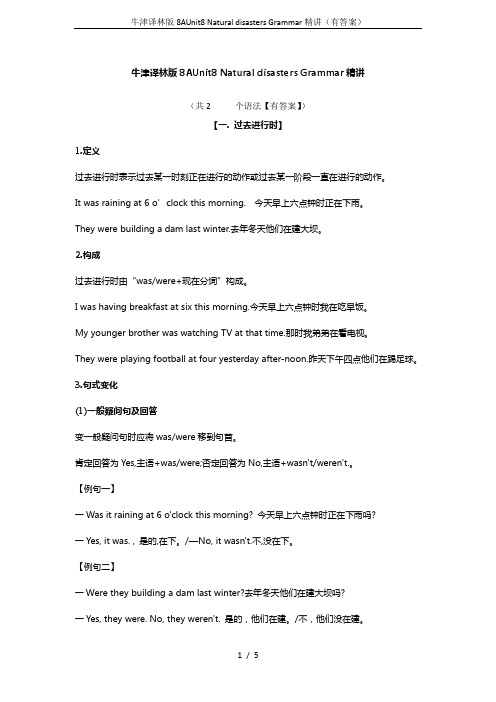
牛津译林版8AUnit8 Natural disasters Grammar精讲(共2个语法【有答案】)【一. 过去进行时】1.定义过去进行时表示过去某一时刻正在进行的动作或过去某一阶段一直在进行的动作。
It was raining at 6 o’clock this morning. 今天早上六点钟时正在下雨。
They were building a dam last winter.去年冬天他们在建大坝。
2.构成过去进行时由“was/were+现在分词”构成。
I was having breakfast at six this morning.今天早上六点钟时我在吃早饭。
My younger brother was watching TV at that time.那时我弟弟在看电视。
They were playing football at four yesterday after-noon.昨天下午四点他们在踢足球。
3.句式变化(1)一般疑问句及回答变一般疑问句时应将was/were移到句首。
肯定回答为Yes,主语+was/were;否定回答为No,主语+wasn't/weren't.。
【例句一】一Was it raining at 6 o'clock this morning? 今天早上六点钟时正在下雨吗?一Yes, it was. , 是的,在下。
/—No, it wasn't.不,没在下。
【例句二】一Were they building a dam last winter?去年冬天他们在建大坝吗?一Yes, they were. No, they weren't. 是的,他们在建。
/不,他们没在建。
(2)否定句肯定句变否定句时在was/were之后加not,was not常缩写为wasn't,were not常缩写为weren't。
2019译林牛津版 8A UNIT8 Natural disaster Task 教学课件 (共27张PPT)教育精品.ppt
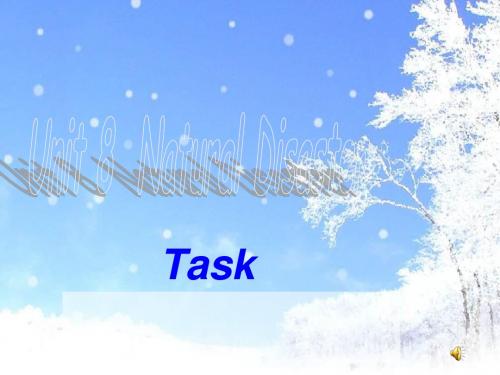
A snowstorm/flood…
A snowstorm/flood ... hit ... on...
I was doing ... when ... The weather was really ... …kept falling around us. I could only hear/see ... Suddenly, a strong… I had to ... When …., I saw… At last, … I felt …
They saw many people waiting at the bus stop.
•
After the snowstorm, many people were trying to clear the snow from the street.
Snowstorm hit Beijing
A snowstorm hit Beijing on Friday, 5 January.
Thank you !
Please show us Walk slowly in the snow
Please showห้องสมุดไป่ตู้us
I stayed at Millie’s home that night. I heard the noise of _tr_a_f_fi_c__ the next morning. People were trying to _c_l_e_a_r___the snow from the streets.
I was doing my(1)_h__o_m_e_w_o__rk__ in the classroom when Mr Wu came in and told us to(2) _g_o_h_o__m_e__e_ar_l_y . My parents could not get home that night because of the heavy snow, so Millie asked me to go to her home. I (3) _s_h_a_re_d__ an umbrella with her while we were walking to the bus stop. The weather was really terrible. The (4)_s_n_o_w_kept falling around us. We could hear the(5)__w_i_n_d__blowing.
牛津译林版8AUnit8 Natural disasters基础大归纳
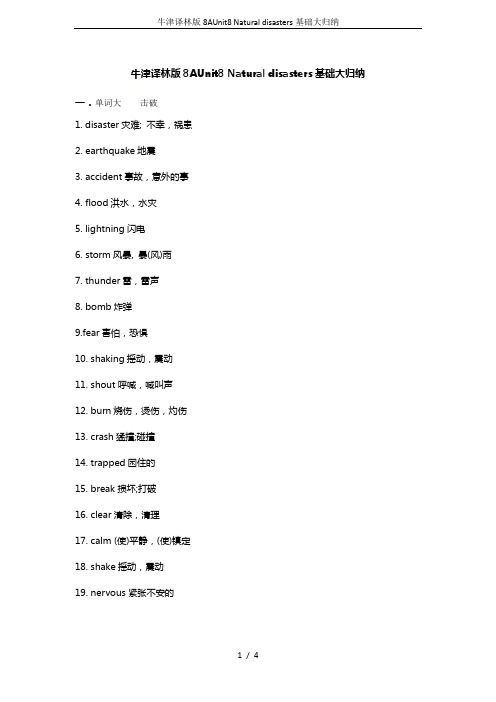
牛津译林版8AUnit8 Natural disasters基础大归纳一.单词大击破1.disaster灾难; 不幸,祸患2. earthquake地震3. accident事故,意外的事4. flood洪水,水灾5. lightning闪电6. storm风暴, 暴(风)雨7. thunder雷,雷声8. bomb炸弹9.fear害怕,恐惧10. shaking摇动,震动11. shout呼喊,喊叫声12. burn烧伤,烫伤,灼伤13. crash猛撞;碰撞14. trapped困住的15. break损坏;打破16. clear清除,清理17. calm (使)平静,(使)镇定18. shake摇动,震动19. nervous紧张不安的20.beat (使)规律作响,作节奏运动二.短语大搜罗1. wake up醒来2. mop up the water用拖布把水擦干净3. thousands of成千上万的4. crash into 撞上5. wash away冲走6. hear about听说7. tell sb. about sth.告诉某人关于某事8. catch fire着火9. at night在夜晚10. at first起先,开始11. feel a slight shake感到轻微的晃动12. under the ground在地下13. in fear惊恐地14. run out of ...跑出来15. try one's best尽某人最大努力16. in all directions四面八方17. fall down掉下来18. come down崩塌,坍塌19. not...at all一点也不20. be trapped被困21. say to oneself自言自语,心里想22. calm down冷静23. shout for help喊救命24. find one's way out找到出路25. move away搬走,移开26. in danger处于危险中27. from side to side从一侧到另一侧28.up and down上上下下29. get on a bus.上公共汽车30. at last最后,终于31. break down ( 车辆或机器)出故障,坏掉32. because of因为,由于33. as..as possible尽可能......34. be on fire着火35. learn from .....学习36. stay away from ......37. cover it.. ......38. see the doctor看医生39. fall over跌倒40. heavy rain大雨三.用法大突破1. begin to do sth.开始做某事2.tell oneself to do sth. 告诉自己去做某事3.see sb. doing sh. 看见某人正在做某事4.Keep+宾语+形容词保持.....5.ask sb. to do sth.叫某人做某事6. have to do sth.不得不做某事。
译林牛津版 8A Unit 8 Natural disasters welcome to the unit 公开课教学课件共25张PPT

Showing Time
1. Act out the conversation.
2. Will Eddie help Hobo to mop the floor? Why? Yes, because… No, because…
One day, Hobo went to Eddie’s home, because his own home was all__w__et____. He was _s_l_ee_p_i_n_g__ when it started to
Challenge your memories
CHECK YOUR PREVIEW
1 point
1.湿透了 2.开始下雨
be all wet start to rain
3.把水拖干净
mop up the water
4.自然灾害
自然把灾水n害拖湿a干t透u净了ral disasters
5.输了决赛 6.冲走村庄 冲走村庄 7.引发大火 交通事故
happens? B:I will stay at home/...
1
2
3
4
A: Look! (Listen!) What is happening?
B: There’s a/an/..._____________________.
A: What do you thinking of it?
B: It is _______. (terrible / frightening / dangerous / exciting/ ……)
__ra_i_n___. When he __w_o__k_e_u_p_, there was water _e_v_e_r_y_w.hHeereasked Eddie to __g_o___home with him because he wanted Eddie to __m__o_p____ all the water
2019年译林牛津版 8A Unit 8 Natural disasters Reading I The Taiwan Earthquake 公开课教学课件共25张PP
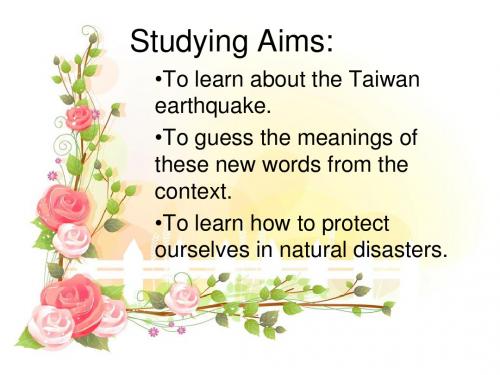
What’s the best way to survive an earthqSuppose there would
be an earthquake,
what should we do to
keep ourselves safe?
If an earthquake happened, what shall we do?
When it was
At first
About two o’clock in the early morning.
What he did
What he heard How he felt
He was sleeping.
He heard a loud noise like thunder. He felt a slight shake.
1.After class, please write a composition about your opinion if there is an earthquake in Jiangdu. 2. Read the article and try to retell the story.
3. Remember the new words in this lesson.
Some people ran out of the building. Outside, people were running in all directions.
Para .3-5
• Timmy screamed after the noise and shaking ended. F
• He could see someone around him .F • When he was trapped, a moment of
牛津译林版八年级上册Unit8《Naturaldisasters》(Studyskills)说课稿
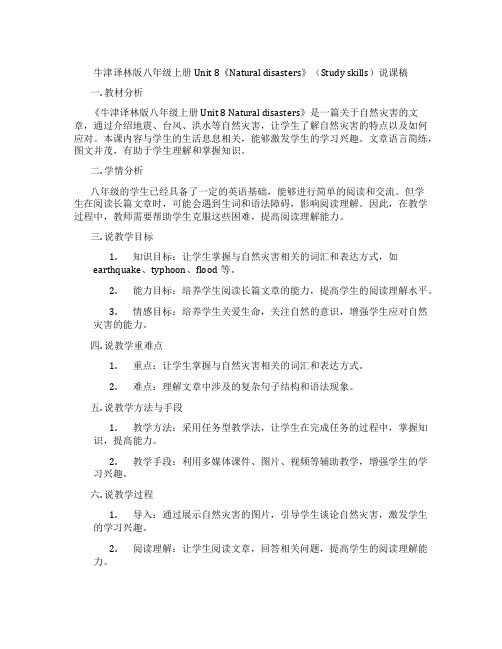
牛津译林版八年级上册Unit 8《Natural disasters》(Study skills)说课稿一. 教材分析《牛津译林版八年级上册Unit 8 Natural disasters》是一篇关于自然灾害的文章,通过介绍地震、台风、洪水等自然灾害,让学生了解自然灾害的特点以及如何应对。
本课内容与学生的生活息息相关,能够激发学生的学习兴趣。
文章语言简练,图文并茂,有助于学生理解和掌握知识。
二. 学情分析八年级的学生已经具备了一定的英语基础,能够进行简单的阅读和交流。
但学生在阅读长篇文章时,可能会遇到生词和语法障碍,影响阅读理解。
因此,在教学过程中,教师需要帮助学生克服这些困难,提高阅读理解能力。
三. 说教学目标1.知识目标:让学生掌握与自然灾害相关的词汇和表达方式,如earthquake、typhoon、flood等。
2.能力目标:培养学生阅读长篇文章的能力,提高学生的阅读理解水平。
3.情感目标:培养学生关爱生命,关注自然的意识,增强学生应对自然灾害的能力。
四. 说教学重难点1.重点:让学生掌握与自然灾害相关的词汇和表达方式。
2.难点:理解文章中涉及的复杂句子结构和语法现象。
五. 说教学方法与手段1.教学方法:采用任务型教学法,让学生在完成任务的过程中,掌握知识,提高能力。
2.教学手段:利用多媒体课件、图片、视频等辅助教学,增强学生的学习兴趣。
六. 说教学过程1.导入:通过展示自然灾害的图片,引导学生谈论自然灾害,激发学生的学习兴趣。
2.阅读理解:让学生阅读文章,回答相关问题,提高学生的阅读理解能力。
3.词汇学习:讲解文章中出现的生词和短语,让学生掌握与自然灾害相关的词汇。
4.语法讲解:分析文章中的复杂句子结构和语法现象,帮助学生理解。
5.小组讨论:让学生分小组讨论如何应对自然灾害,培养学生的合作意识。
6.总结:对本节课的内容进行总结,强化学生的记忆。
7.作业布置:让学生课后写一篇关于自然灾害的短文,提高学生的写作能力。
译林牛津版8A Unit 8 Natural disasters Reading (1) 教案

译林牛津版8A Unit 8 Natural disastersReading (1) 教案Unit 8 Natural disasters Reading (1) 教案Teaching aims:1.To develop the ability to infer the general meaning from keywords and context.2.To reinforce students’ ability to skim text for overall meaning and scan for details.3.To learn to protect ourselves when the earthquake happens. Important and difficult point:To develop students’ reading skills.Teaching procedures:Step1. Free talkWhat natural disasters do you knowStep2. Pre-reading1. Ask questions by showing some pictures of natural disasters one by one: thunder and lightning, snowstorm, typhoon, flood, sandstorm, drought, snow slide, hailstone, hurricane, earthquake.2. Show some pictures of earthquake to check the new words and expressions.I can see some houses shaking.I can see pieces of glass and bricks falling down.I can see walls coming down.I can see people running in all directions.I can hear a loud noise like a bomb.I can hear some people screaming.3. Matching some other new words and phrases.Step3. While-reading1. Skimming(1).Ask: Can you give us another title to replace ‘The Taiwan earthquake ’(2).Let the students divide the passage.Para(s) ___: The earthquake came.Para(s) ___: Timmy was trapped.Para(s) ___: Timmy was safe.2. Scanning(1). Read paras 1-2 to fill in the table.When the earthquake came, what did Timmy …feelhearseedo(2). Read paras 3-4 to answer 5 ‘T/F’ questions.1. He could not see anything at all.2. He felt nervous and his head was beating fast.3. A moment of fear went through his body.4. He shouted for help, but no one came.5. He started to pull himself quickly through the dark.(3). Read para 5 to answer 2 questions.1. What did people do to help him out2. What did he see at last(4).Rearrange partB2 on page 95 into correct order.Step4 .Post-readingFinish a story entry.Li Dan is a girl. She lives in Wenchuan. She survived the e_________ in 2023. She was shopping when she heard a loud noise.It was like the noise of t______. Then the noise became really loud. It sounded like b_____ under the ground. After that, pieces of glass and b____ fell down.When the noise ended, she was t______ and could not see anything at all. A moment of f____ went through her mind. Then she tried to c____ down and s_______ for help. Finally, people moved away the bricks and stones and saved her.Step5. Group work.Discuss: What should we do in an earthquakeStep6. Conclusion.What should we do in an earthquake \If you are trapped in the earthquake, you should:calm downtry to find your way outshout for help3. We should protect the earth, protect the environment. Step7. Homework.1. Write a report about Timmy.2. Retell Timmy’s story with your own words.1。
牛津译林版八年级上册Unit 8《Natural disasters》(Task)教学设计

牛津译林版八年级上册Unit 8《Natural disasters》(Task)教学设计一. 教材分析牛津译林版八年级上册Unit 8《Natural disasters》主要介绍了自然灾害,包括地震、洪水、台风等,通过学习本单元,学生可以掌握有关自然灾害的词汇和表达方式,了解自然灾害发生的原因及应对措施。
Task部分要求学生阅读一篇关于自然灾害的文章,然后进行相关练习,培养学生的阅读能力和解决问题的能力。
二. 学情分析八年级的学生已经具备了一定的英语基础,能够进行简单的阅读和交流。
但部分学生在阅读长篇文章时,可能会遇到生词和语法难题,影响阅读理解。
此外,学生对于自然灾害的了解程度不一,需要教师在教学中进行引导和补充。
三. 教学目标1.知识目标:学生能够掌握有关自然灾害的词汇和表达方式,了解自然灾害发生的原因及应对措施。
2.能力目标:学生能够阅读并理解关于自然灾害的文章,提高阅读能力;通过任务型教学,培养学生的解决问题能力。
3.情感目标:培养学生关爱生命,关注自然的意识,提高学生应对自然灾害的能力。
四. 教学重难点1.重点:学生能够掌握有关自然灾害的词汇和表达方式,阅读并理解关于自然灾害的文章。
2.难点:学生能够运用所学知识,解决实际问题,提高应对自然灾害的能力。
五. 教学方法1.任务型教学法:通过任务型教学,让学生在实践中掌握知识,提高能力。
2.情境教学法:创设情境,让学生在真实的环境中学习,提高学生的学习兴趣。
3.合作学习法:引导学生进行小组合作,培养学生的团队精神和沟通能力。
六. 教学准备1.教师准备:提前准备关于自然灾害的文章,整理相关词汇和表达方式,设计任务型练习。
2.学生准备:预习课文,了解自然灾害的基本知识,准备参与课堂活动。
七. 教学过程1.导入(5分钟)教师通过提问方式引导学生谈论自然灾害,激发学生的学习兴趣。
例如:“你们知道哪些自然灾害?它们发生的原因是什么?”2.呈现(10分钟)教师呈现关于自然灾害的文章,让学生快速阅读,了解文章大意。
牛津译林英语 8A Unit 8Natural Disasters
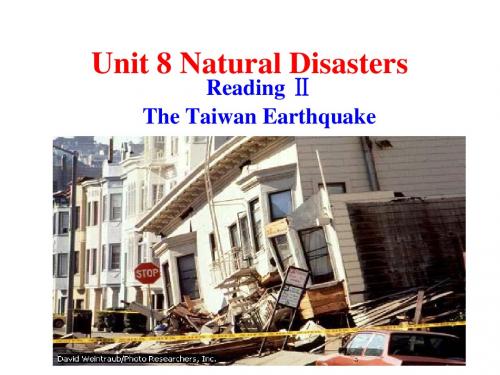
ห้องสมุดไป่ตู้
书面表达 请根据下面信息,写一篇介绍四川 雅安地震的短文。 发生时间:2013年4月20日早晨 发生地点:雅安地震 地震损失:200多人遇难,1万多人受伤, 成千上万的房屋倒塌。 救灾情况:成千上万的士兵前来援助, 救援队日夜搜寻幸存人员。人们纷纷 捐款捐物帮助当地人们走出困境。
Unit 8 Natural Disasters
Reading Ⅱ The Taiwan Earthquake
Task One Read and Discuss
what Timmy saw Can you what Timmy heard in different find out how Timmy felt parts?
Let’s summarize the story!
Before Timmy was trapped (Paras 1-2) When Timmy was trapped (Paras 3-4) feel a slight shake, hear a loud noise like thunder… like bombs under the ground, run in all directions, come down, feel nervous, say to myself, shout for help… find the way out, noise, scream, move away, bright daylight…
3. 我正在努力找出路时,这时突然听到 我的上方有声音。 I was _______________ trying to find my way out when I suddenly heard some noise above me. 4. 我听到了兴奋的人们的呼喊声。 shouts from excited people I heard ________________________.
牛津译林版八年级英语上册 Unit 8 Natural disasters Integrated s

这是学生练习听力的一个
通过对话训练及表演,培养学生课堂情境对话能力。
重要环节,同时要了解紧急
求助电话所需交代的内容。学会以后遇到此类事情如何求助。在听力前适当对学生进行听力技巧指导很有必要,即Listening tips,如遇到长的词组及句子表达时,提倡用缩写,如three forty-five可以速记成3:45;Starlight Street, Sunshine Town速记成SSST等。
Step9. Homework &
consolidation
Read and remember
Discuss and write(whiteboard)
Watch and discuss.
Write the number
Listen and answer.
Practice and act.
Listen and write.
Step 2. Revision
Watch a video and review some natural disasters the students are familiar with.
Step 3.Write the correct telephone number under each picture Part A1
情感目标:学生通过学习本课知道以后怎样合理面对常见自然灾难,即学会怎样自救和他救,
同时也能提高安全意识。
教学重点:
1.学生听说读写综合技能的培养。
2.在自己遇到事故灾难时如何应对。
3.讨论如何预防和避免意外事故。
2019年译林牛津版 8AUNIT8 Natural disaster Task 教学课件 (共20张PPT)精品物理
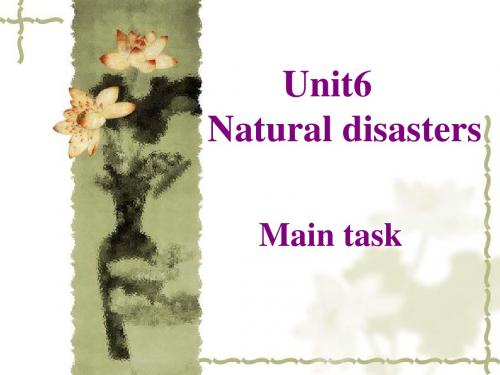
Useful expressions for the last part:
1. hear noise/cries/shouts---
2. saw people removed the snow/cleaned the way / sent the victims to the hospital / got something from the flood---
Unit6 Natural disasters
Main task
How many natural disasters do you know now?
A fire An earthquake(in Wenchuan) A flood A rainstorm A typhoon A snowstorm A sandstorm An accident
Make the list !
Where did it happen? Changzhou Introduction
When did it happen? Sunday,15th,Aug. Where were you? at Lucy’s home
During the Disaster/ accident
Sandy wants to write
a. we lost our umbrella in the wind
Notes
b. I was doing my homework in the classroom and Mr.
Wu told us to go home early
c. could only hear the wind
What did she hear? noise of traffic
译林牛津版 8A Unit 8 Natural disasters task 公开课教学课件
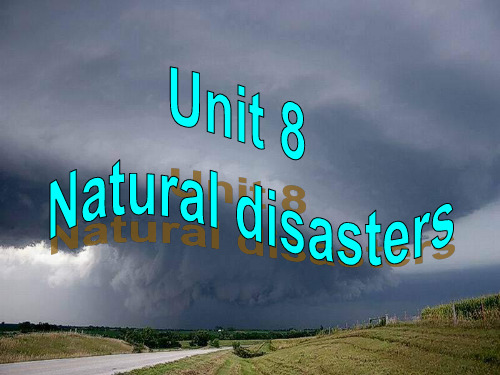
How to write a natural disaster. Para 1: Introduction Para 2: During the disaster
Para 3: After the disaster
Para 1: Write the introduction part
Where did it happen? Introduction
An earthquake / A flood / A snowstorm / … hit … I was doing … when…. … because of the heavy rain / snow…. We could only hear / see …. … kept falling. Suddenly, …. … had to walk slowly / pull oneself through …. … was really terrible.
• What did you see during the storm? • What happened to you during the
storm? • What did you hear after the storm? • What did you see after the storm?
Snowstorm hit Beijing
many people _w_a__it_i_n_g_ there. At last, we got on
a bus to Millie’s home.
I stayed at Millie’s home that night. I heard
the noise of _t_r_a_ff_i_c_ the next morning. People were trying to _c_le_a_r_ the snow from the streets.
2019译林牛津版8A Unit 8 Natural disasters Grammar 教学课件 (共17张PPT)教育精品.ppt
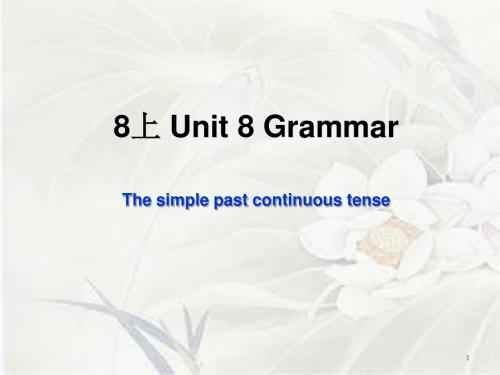
12
What were they doing yesterday?
08.00
David 10.00
Celine
George 05.00
Adam
Mary
Bob
13
And now it’s your turn !
What were you doing yesterday
14
Simple Paappened at a specific time in the past
Interrogative
Was
I you we they he she it
7
Were
studying?
Was
NOTE: Verbs of thinking and feeling usually do not use the Past Continuous but the Past Simple. E.g.: think, know, see, hear, like • We were good friends.We knew each other well. (not “were knowing”) • I was enjoying the party but Chris wanted to go home. (not “was wanting”)
8上 Unit 8 Grammar
The simple past continuous tense
1
THE SIMPLE PAST
• The simple past is used to describe actions and events that are now completed and no longer true in the present.
- 1、下载文档前请自行甄别文档内容的完整性,平台不提供额外的编辑、内容补充、找答案等附加服务。
- 2、"仅部分预览"的文档,不可在线预览部分如存在完整性等问题,可反馈申请退款(可完整预览的文档不适用该条件!)。
- 3、如文档侵犯您的权益,请联系客服反馈,我们会尽快为您处理(人工客服工作时间:9:00-18:30)。
? home. I _s_h_a_r_e_d_ an umbrella with her
while we were walking to the bus stop. The
During the storm
weather was really terrible. The _s_n__o_w__
kept falling around us. We could hear the _w_in__d__blowing.
Hear
After the Do disaster
Feel
some noise
shout for help
be happy to see the bright daylight again
What can we do to help those people who are suffering(受苦) from natural disasters?
let’s cherish(珍爱) our world. Let’s work hand in hand to make our world more beautiful.
1. Finish writing the article about a natural disaster .
2. Search the Internet for more about the natural disasters which happened in the world and write a report.
1
2
3
Friday, 5th January
4
5
A snowstorm
Snowstorm hit Beijing
topic
A snowstorm hit Beijing on Friday, 5
January. I was doing my h__o_m_e_w__o_rkin the
Introd?uction
(beginning, main body & ending)
2. Put a
if there are some mistakes(错误).
3. Put a in front of good phrases or sentences
Conclusion perfect excellent good just so so not so good
in the wind and I nearly fell over. We had to walked slowly in
the deep snow. When we arrived at the bus stop, we saw many
waiting there. At last, we got on a bus to Millie’s houhsee.ar
introduction
during the disaster
after the disaster
When and where was the disaster? Where was I? What did I do? What happened to me? What did I hear? What did I see? Where was I? What did I hear? What did I see? How did I feel?
I stayed at Millie’s home that night. I heard the noise of traffic
the next morning.rom
the streets.
see
Let’s know the structure!
Notes about the earthquake
Intro- Place Taiwan duction Time 15th July, 1999
During the disaster
Hear See Feel
a loud noise, screaming fall down, run wildly in all directions be trapped(困住的)
Suddenly , a strong wind came from behind. I lost my (6)__u_m_b_r_e_l_la___ in the wind and I nearly(7) __fe_l_l__over. We had to walk slowly in the deep snow. When we arrived at the bus stop, we saw many people(8)_w_a_i_ti_n_g__there. At last, we got on a bus to Millie’s home.
Suddenly, a strong wind came from behind….
I lost my umbrella in the wind and I nearly fell over. We had to walk slowly in the deep snow.
What did they see?
After th?e storm
place Snowstorm hit Beijing
time
A snowstorm hit Beijing on Friday,d5toh,January.
I was doing my homework in the classroom when Mr Wu came
Hear
After the Do disaster
Feel
some noise
shout for help
be happy to see the bright daylight again
Evaluating(评价)
1. Put a if the article is well organized.
Thank you !
Please show us Walk slowly in the snow
Please show us
classroom when Mr Wu came in and told us tog_o_h_o_m__e_e_a_r_l.y My parents could not
get home that night because of the heavy
snow, so Millie asked me to go to her
talk about in each weather was really terrible. The snow kept falling around us.
We could hear the wind blowing.
part? Suddenly, a strong wsinedecame from behind. I lostdmoy umbrella
I stayed at Millie’s home that night. I heard the noise of _tr_a_f_fi_c__ the next morning. People were trying to _c_l_e_a_r___the snow from the streets.
I stayed at Millie’s home that night. I heard the noise of (9)_t_r_a_ff_ic_the next morning. People were trying to(10) _c_le_a_r_ the snow from the streets.
Suddenly , a strong wind came from behind. I lost my u__m_b_r_e_ll_a_ in the wind and I nearly __fe_l_l__ over. We had to walk slowly in the deep snow. When we arrived at the bus stop, we saw many people _w_a_i_t_in_g__. At last, we got on a bus to Millie’s house.
They saw many people waiting at the bus stop.
•
After the snowstorm, many people were trying to clear the snow from the street.
Snowstorm hit Beijing
A snowstorm hit Beijing on Friday, 5 January.
I experienced(经历) the earthquake…
Notes about the earthquake
Intro- Place Taiwan duction Time 15th July, 1999
During the disaster
Hear See Feel
a loud noise, screaming fall down, run wildly in all directions be trapped
I saw/ heard/felt …
People were trying to …
topic
Introd?uction During?the disaster
After th?e disaster
Watch the video and discuss
1.What can you hear?
2.What can you see?
What should we ihnoamnedtthoaldtfenuiesghltot
